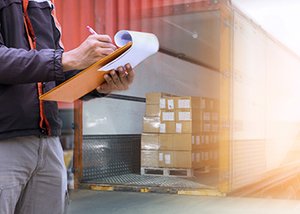By Cliff Litke, IRT Coordinator
Employers of dock workers, freight handlers and their supervisors may consider some of the following advice or best practices at their worksite to reduce the risk of worker exposure to COVID-19:
-Frequently clean forklifts and other mobile equipment using disinfectant wipes.
-Clean and disinfect internal shipping areas, thoroughly cleaning anything that is touched. That includes but is not limited to desks, handrails, dock equipment, doors, windows, electronic devices and scanners.
-Limit access to warehouse environments and require drivers to remain in vehicles wherever possible.
-Increase physical distancing by modifying shift patterns to minimize the number of workers on site at the same time and consider staggering start and finish times to help reduce worker contact in confined spaces, like changing rooms, bathrooms and lunch rooms.
-Provide nitrile gloves for workers who could be exposed to the virus when loading/unloading freight, especially those who may be working the load by hand (hand-bombing).
-Provide adequate disinfecting and sanitization facilities to ensure regular hand sanitization can be maintained.
Workers also have their health and safety responsibilities — If you’re a worker, you have three key rights: the right to know about hazards in the workplace; the right to participate in health and safety activities in the workplace; and the right to refuse unsafe work.
Below is some information you should know to take to help prevent the spread of COVID-19:
Know when not to come to work. The following workers must not go to work:
-Anyone with COVID‐19-like symptoms such as a sore throat, fever, sneezing, or coughing must self‐isolate at home for a minimum of 10 days from onset of symptoms, until their symptoms are completely resolved.
-Workers who have travelled internationally. In these cases, they must remain away from the workplace for at least 14 days.
-They live in the same household as a confirmed or clinical COVID-19 case who is self-isolating.
-Workers who have been exposed to anyone confirmed to have COVID-19, or to anyone with possible symptoms of COVID-19
-Take other preventative measures while at work
-Comply with the employer’s instructions around minimizing exposure to COVID-19.
-Wash their hands frequently, and/or use hand sanitizer.
-Take steps to minimize exposure to COVID-19 while away from work.
Right to refuse work
Workers in Alberta have the right to refuse work if they believe it presents an undue hazard.
An undue hazard is an “unwarranted, inappropriate, excessive, or disproportionate” risk, above and beyond the potential exposure a general member of the public would face through regular, day-to-day activity.


